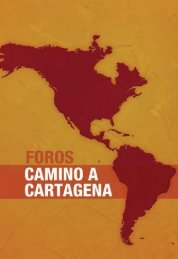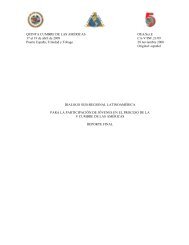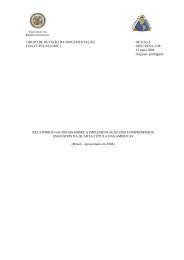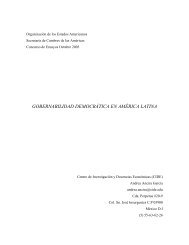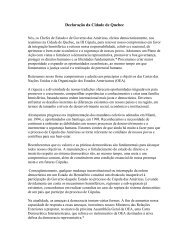The Road to Hemispheric Cooperation: Beyond the Cartagena
The Road to Hemispheric Cooperation: Beyond the Cartagena
The Road to Hemispheric Cooperation: Beyond the Cartagena
Create successful ePaper yourself
Turn your PDF publications into a flip-book with our unique Google optimized e-Paper software.
Although <strong>the</strong> content of <strong>the</strong> draft of <strong>the</strong> final summit decla-<br />
ration focused on physical integration and regional cooperation,<br />
political differences arising in <strong>the</strong> general debate<br />
prevented its approval. In particular, <strong>the</strong> Latin American<br />
delegations and <strong>the</strong> United States and Canada were unable<br />
<strong>to</strong> resolve <strong>the</strong> question of Cuba’s participation in future<br />
summit meetings and <strong>the</strong> vindication of Argentina over <strong>the</strong><br />
Malvinas/Falkland Islands.<br />
Strong ideological differences prevail among <strong>the</strong> countries<br />
of <strong>the</strong> region and some regimes reject <strong>the</strong> political principles<br />
and commitments <strong>to</strong> representative democracy, open<br />
markets and hemispheric integration on which <strong>the</strong> summit<br />
process was built 18 years ago. 16 Last year, Venezuelan<br />
President Hugo Chávez proposed <strong>the</strong> creation of an<br />
“anti-imperialist” organization, without <strong>the</strong> United States<br />
and Canada. Likewise, in November 2011, Ecuadorian<br />
President Rafael Correa confirmed his comments about<br />
replacing <strong>the</strong> OAS by <strong>the</strong> “Community of Latin American<br />
and Caribbean States” (CELAC). 17 CELAC was formed in<br />
December 2011 and it brings <strong>to</strong>ge<strong>the</strong>r <strong>the</strong> Caribbean Community<br />
(CARICOM), <strong>the</strong> Union of South American Nations<br />
(UNASUR), Central America and Mexico. <strong>The</strong> organization<br />
has a commitment <strong>to</strong> cooperate in infrastructure development:<br />
roads, communications, technology, energy, trade,<br />
security, poverty alleviation and o<strong>the</strong>r related issues.<br />
After accusing <strong>the</strong> OAS of being biased in favor of hegemonic<br />
nations and serving as an instrument of <strong>the</strong> United<br />
States, Correa expressed his view that CELAC should <strong>the</strong><br />
new forum for conflict resolution in Latin America. Correa<br />
also questioned whe<strong>the</strong>r <strong>the</strong> Inter-American Commission<br />
on Human Rights (IACHR) is headquartered in Washing<strong>to</strong>n,<br />
D.C. 18 On <strong>the</strong> same line, <strong>the</strong> Bolivarian Alliance for <strong>the</strong><br />
Peoples of our America (ALBA) presidents proposed that<br />
<strong>the</strong> CELAC should have its own democracy provisions,<br />
which would be limited <strong>to</strong> preventing coups ra<strong>the</strong>r than upholding<br />
<strong>the</strong> principles of representative democracy. A week<br />
after <strong>the</strong> <strong>Cartagena</strong> Summit, President Chávez announced<br />
that Venezuela would withdraw from <strong>the</strong> American Convention<br />
on Human Rights, <strong>the</strong> principal human rights treaty of<br />
<strong>the</strong> system. Chávez and o<strong>the</strong>r presidents, such as Rafael<br />
Correa and Daniel Ortega, expressed hope that <strong>the</strong> new<br />
organization would fur<strong>the</strong>r Latin-American integration, end<br />
United States’ hegemony, and consolidate control over regional<br />
affairs. 19 With <strong>the</strong> exception of <strong>the</strong> ALBA countries,<br />
<strong>the</strong> rest of CELAC’s member states have no intention of<br />
replacing <strong>the</strong> OAS. At this stage, CELAC is more symbolic<br />
than effective.<br />
In addition, for <strong>the</strong> first time in <strong>the</strong> tumultuous regional<br />
his<strong>to</strong>ry of Latin America, <strong>the</strong> United States is no longer<br />
<strong>the</strong> source of conflict, as it was in <strong>the</strong> past. Instead, political<br />
provocation comes from a group of Latin American<br />
countries that is walking away from <strong>the</strong> summit commitments.<br />
<strong>The</strong>se countries have a different view of democratic<br />
governance, according <strong>to</strong> which democracy is<br />
defined exclusively on <strong>the</strong> basis of conducting popular<br />
elections. In this authoritarian shift, individual rights are<br />
marginalized in favor of <strong>the</strong> abstract interests of <strong>the</strong> collective.<br />
In an official publication, <strong>the</strong> Bolivian vice president<br />
explains this new vision: “This is <strong>the</strong> moment in<br />
which antagonistic groups in our society with irreconcilable<br />
societal projects must settle <strong>the</strong>ir existence in an<br />
open, naked, battle of forces. Confrontation is <strong>the</strong> only<br />
resort <strong>to</strong> resolve <strong>the</strong> social struggles when no o<strong>the</strong>r possibilities<br />
are left. That was what happened in Bolivia...” 20<br />
In a similar vein, President Chávez of Venezuela has said<br />
that “representative democracy for Venezuela has been<br />
a trap, and our Constitution compels us <strong>to</strong> strive for participa<strong>to</strong>ry<br />
democracy.” 21<br />
Although <strong>the</strong> general scenario for hemispheric relations is<br />
negative and brings serious concerns for <strong>the</strong> future of <strong>the</strong><br />
summit process, we highlight a few positive outcomes of<br />
<strong>the</strong> <strong>Cartagena</strong> Summit:<br />
●● All 34 summit leaders achieved consensus on all <strong>the</strong><br />
paragraphs of <strong>the</strong> draft final declaration related <strong>to</strong> development,<br />
cooperation, violence and insecurity, energy, and<br />
education. <strong>The</strong> declaration was not approved because of<br />
lack of consensus among <strong>the</strong> presidents on two specific<br />
issues: Cuba and drugs.<br />
●● On <strong>the</strong> issue of drugs, although <strong>Cartagena</strong> Summit leaders<br />
did not agree on a formula for tackling this problem,<br />
<strong>the</strong>y laid <strong>the</strong> basis for future multilateral discussions<br />
on this recurrent <strong>the</strong>me in <strong>the</strong> dialogue between Latin<br />
America and <strong>the</strong> United States. <strong>The</strong> heads of state and<br />
government of <strong>the</strong> Americas mandated <strong>the</strong> OAS <strong>to</strong> analyze<br />
and propose a new regional anti-drug strategy. 22<br />
<strong>The</strong> <strong>Road</strong> <strong>to</strong> <strong>Hemispheric</strong> <strong>Cooperation</strong>: <strong>Beyond</strong> <strong>the</strong> <strong>Cartagena</strong> Summit of <strong>the</strong> Americas<br />
<strong>The</strong> Brookings Institution ❘ Latin America Initiative<br />
94



